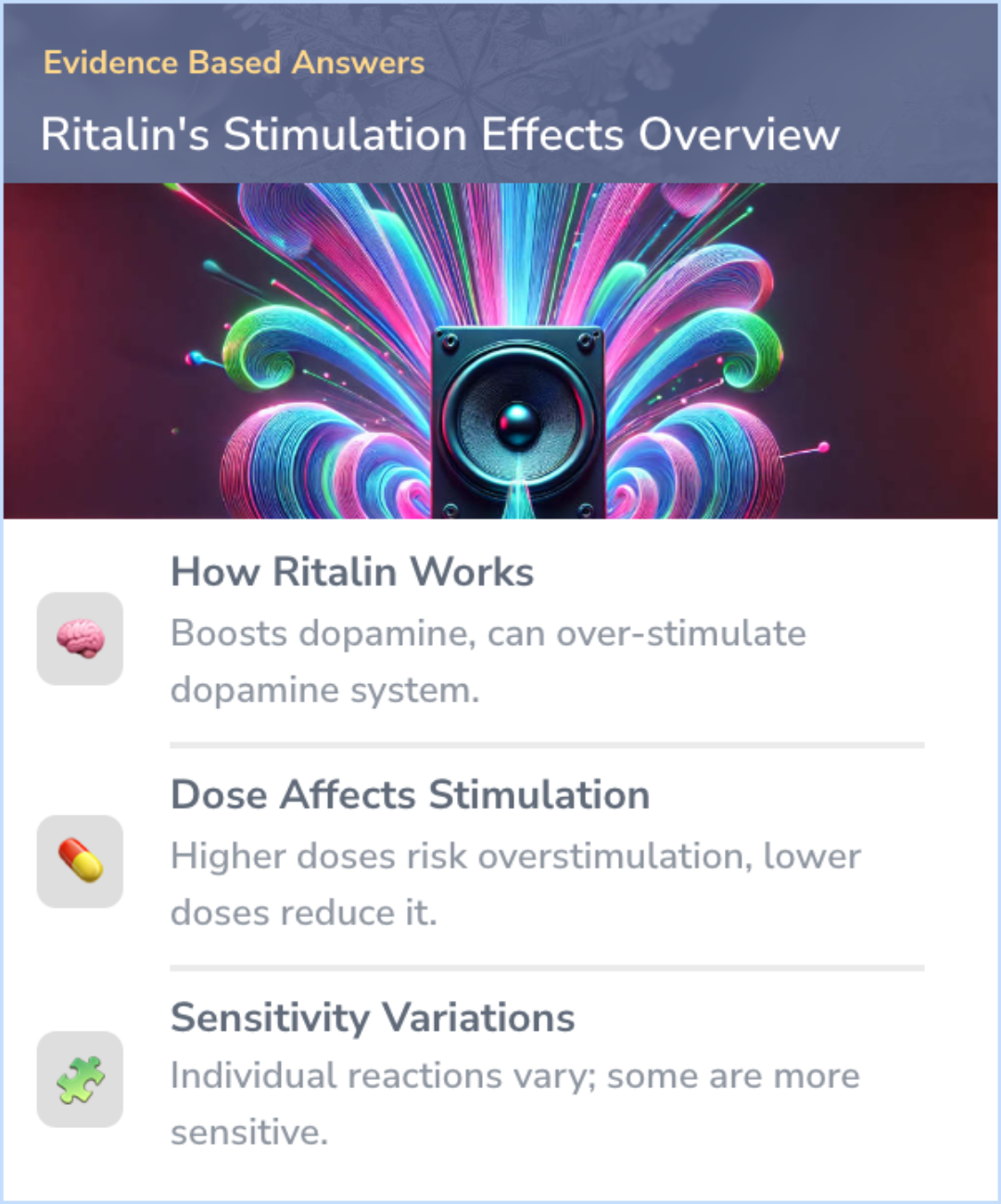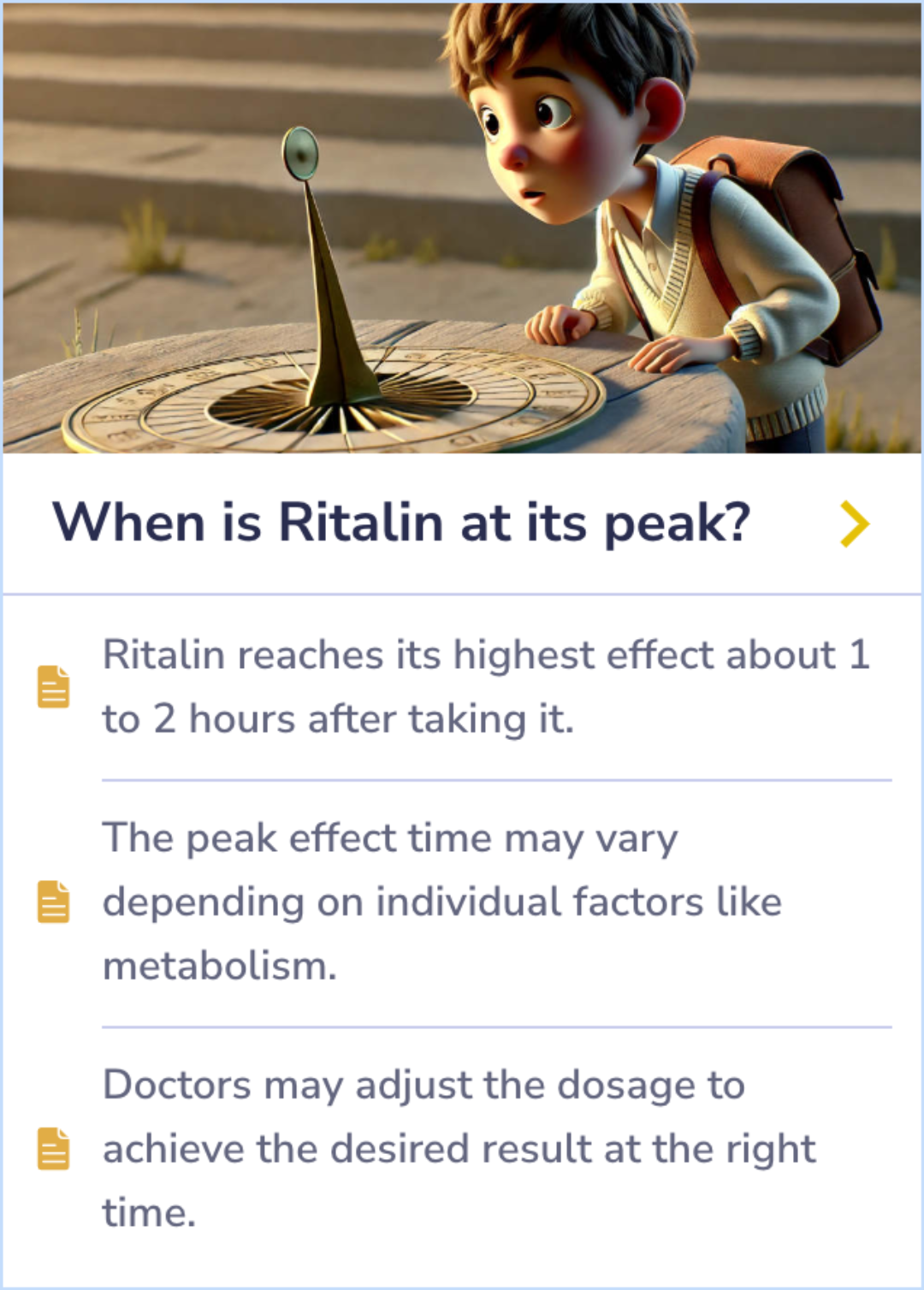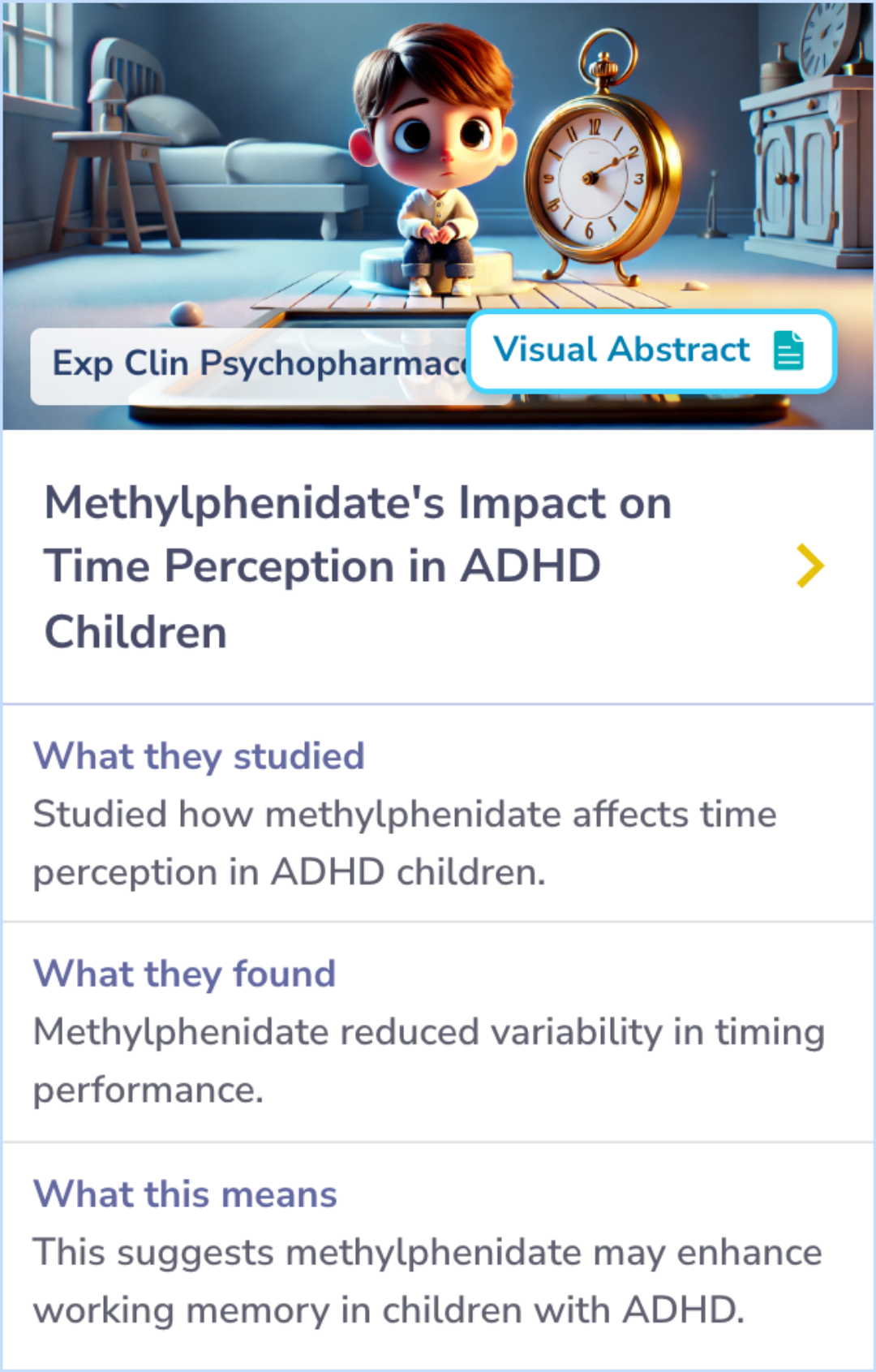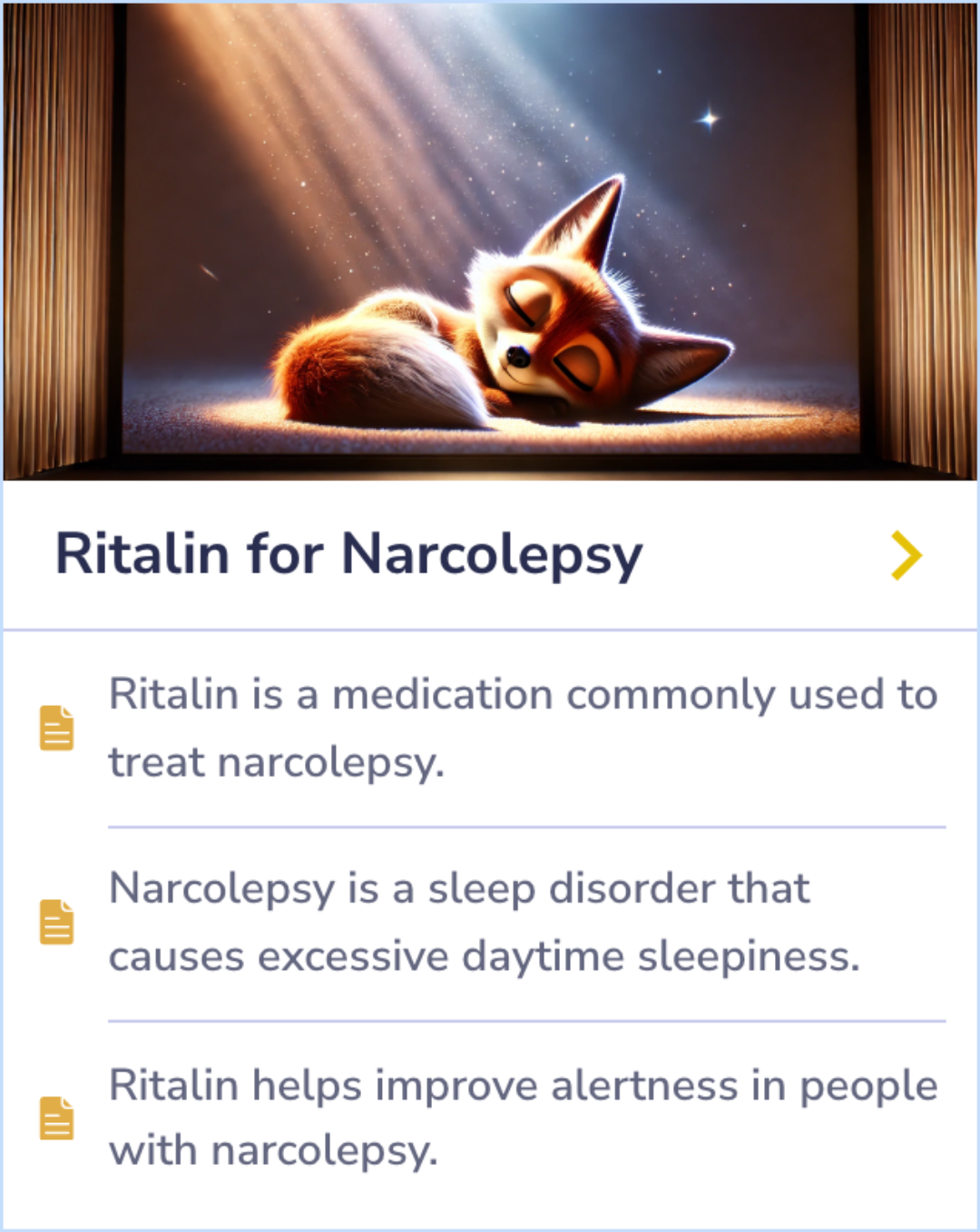Ritalin
Evidence Based Answers
Does Ritalin cause overstimulation?
Taking Ritalin without ADHD can lead to enhanced focus but also risks like overstimulation, especially if taken in higher doses or if one is more sensitive.
Published: November 5, 2024
Click to explore a section:

Ritalin affects dopamine, with dose and sensitivity influencing overstimulation risks.
Background: How Ritalin Affects Dopamine and Stimulation
Ritalin works by increasing dopamine, a key brain chemical related to motivation and reward, by blocking dopamine transporters in the brain. This effect can improve attention in people with ADHD.
However, it may also lead to a sense of overstimulation in some users, where dopamine effects feel very intense or heightened. Studies suggest that Ritalin may, in certain cases, cause an 'overactive' dopamine response.
However, it may also lead to a sense of overstimulation in some users, where dopamine effects feel very intense or heightened. Studies suggest that Ritalin may, in certain cases, cause an 'overactive' dopamine response.
“
Source Quotes:
Methylphenidate increased efflux of dopamine from neurons and inhibited dopamine reuptake from the synaptic cleft.
We hypothesize that under certain circumstances methylphenidate overactivates the dopamine system, making the experience of the drug itself 'very salient'.
Background: Dose-Dependent Side Effects of Ritalin
Ritalin’s effects, including possible overstimulation, can depend on the dose taken. Higher doses may increase the risk of side effects, such as agitation or irritability.
This means that while low doses might help manage ADHD symptoms, higher doses may intensify stimulant effects, impacting mood and behavior.
This means that while low doses might help manage ADHD symptoms, higher doses may intensify stimulant effects, impacting mood and behavior.
“
Source Quotes:
Up to a point, higher doses produce larger clinical responses (reductions in ADHD symptoms) but also result in increased side effects (anorexia, insomnia, stereotypic behavior, etc.).
Insomnia and nervousness are the most commonly reported adverse effects in patients using methylphenidate.
Background: Individual Sensitivity to Ritalin’s Stimulant Effects
Responses to Ritalin can vary widely. Some individuals are more sensitive to its stimulant effects, which can cause overstimulation even at standard doses.
Sensitivity to Ritalin depends on various factors, including age and individual brain chemistry, leading to different experiences with the medication.
Sensitivity to Ritalin depends on various factors, including age and individual brain chemistry, leading to different experiences with the medication.
“
Source Quotes:
Increases in heart rate and blood pressure induced by methylphenidate showed significant variability among individuals.
Large individual differences in response to stimulant drugs... are not fully accounted for by simple factors such as age, weight, and drug metabolism.
Background: Dopamine and Serotonin Balance in Ritalin's Effects
Ritalin’s stimulant effects may be influenced by both dopamine and serotonin levels, which impact mood and energy. While dopamine increases can improve focus, an imbalance with serotonin might lead to overstimulation.
This complex interaction affects individuals differently, and researchers are studying how these neurotransmitters contribute to varied responses to the medication.
This complex interaction affects individuals differently, and researchers are studying how these neurotransmitters contribute to varied responses to the medication.
“
Source Quotes:
Investigators have postulated that methylphenidate may work via serotonergic neurons to reduce hyperactivity by restoring a lost balance between certain dopaminergic and serotonergic neuronal circuits.
Methylphenidate increases extracellular dopamine in the brain, as do cocaine and methamphetamine, the most commonly abused stimulant drugs.
Key Takeaways
Conclusions
Ritalin, a common ADHD treatment, functions by increasing dopamine levels to boost attention but may cause overstimulation in certain conditions.
The potential for overstimulation varies with dosage and individual sensitivity; higher doses often lead to heightened stimulant effects, making tailored dosing crucial.
Research indicates a need for balanced dopamine and serotonin levels to mitigate overstimulation, as these neurotransmitters significantly affect mood and energy.
The potential for overstimulation varies with dosage and individual sensitivity; higher doses often lead to heightened stimulant effects, making tailored dosing crucial.
Research indicates a need for balanced dopamine and serotonin levels to mitigate overstimulation, as these neurotransmitters significantly affect mood and energy.

Background: Psychiatric Risks
Stimulant medications like Ritalin can lead to the emergence of new psychotic or manic symptoms. These include hallucinations or delusional thinking and can occur in children or adolescents even if there is no previous history of psychiatric disorders. Although rare, they can manifest in about 0.1% of patients during short-term studies.
Additionally, stimulant use may worsen symptoms in individuals with existing behavioral disturbances or thought disorders, such as those associated with psychotic disorders. For those with ADHD and bipolar disorder, stimulants might induce manic or mixed episodes.
Additionally, stimulant use may worsen symptoms in individuals with existing behavioral disturbances or thought disorders, such as those associated with psychotic disorders. For those with ADHD and bipolar disorder, stimulants might induce manic or mixed episodes.
Personal Experiences
Perspectives: Managing Ritalin Overstimulation
In the discussion on Ritalin and overstimulation, perspectives vary widely. One comment emphasizes combining Ritalin with Lexapro and using methods like cutting caffeine, alcohol, and incorporating mindfulness to manage anxiety.
Another comment highlights the role of eating schedules in managing Ritalin’s side effects, suggesting timing doses away from meals. While some suggest exercise or reducing caffeine, others note many stimulant side effects may decrease over time.
Another comment highlights the role of eating schedules in managing Ritalin’s side effects, suggesting timing doses away from meals. While some suggest exercise or reducing caffeine, others note many stimulant side effects may decrease over time.
Reddit: u/Disastrous_Review112
I did find that the anxiety was worse when I started on Ritalin, but has gotten less over time... Reduce/eliminate caffeine ... Propranolol ... Practising regular mindfulness can help ...Evidence Summary
Timing Ritalin’s Peak Effect for Best Results
Ritalin generally reaches its peak effect between 1 to 2 hours after taking it, though this timing can vary based on personal factors, such as metabolism.
Doctors may fine-tune doses to help individuals experience Ritalin’s effects at the most beneficial time for their needs, adjusting as necessary to find the right balance for each person.
Doctors may fine-tune doses to help individuals experience Ritalin’s effects at the most beneficial time for their needs, adjusting as necessary to find the right balance for each person.
Evidence Summary
Methylphenidate’s Impact on Timing Consistency in ADHD
Children with ADHD were tasked with holding a lever down for a set time while on and off methylphenidate (MPH). MPH didn’t change the overall number of correct lever holds or the average hold duration, but it did make timing more consistent.
The medication led to fewer extremely short holds and more holds within a 10 to 11-second range, showing improved control over timing.
This suggests MPH may help with timing consistency, a challenge for many with ADHD, without affecting how long they can hold the lever on average.
The medication led to fewer extremely short holds and more holds within a 10 to 11-second range, showing improved control over timing.
This suggests MPH may help with timing consistency, a challenge for many with ADHD, without affecting how long they can hold the lever on average.
Evidence Summary
Ritalin’s Role in Managing Narcolepsy
Ritalin helps people with narcolepsy manage daytime sleepiness, improving their ability to stay awake and alert. By enhancing focus, it supports those affected by this sleep disorder in staying attentive and more energized throughout the day.
Its primary role in narcolepsy treatment involves counteracting excessive drowsiness, enabling individuals to maintain a steadier level of alertness during daily tasks.
Its primary role in narcolepsy treatment involves counteracting excessive drowsiness, enabling individuals to maintain a steadier level of alertness during daily tasks.


